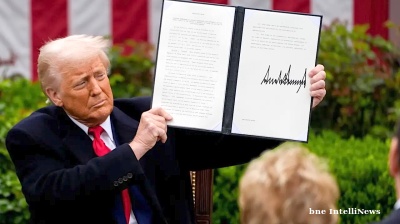The ruling Croatian Democratic Union (HDZ) led by Prime Minister Andrej Plenkovic as expected won the April 17 general election, according to preliminary results from the state election body, DIP, with 70% of the votes counted.
This is the third victory in a row for Plenkovic’s party, which has been in power since 2016. However, it will need a partner to form a government, with the most likely candidate being the rightwing Homeland Movement.
According to the DIP’s preliminary results, HDZ will have 63 seats in the next parliament – three fewer compared to after previous election held in 2020.
Although Plenkovic’s party leads, it will have a hard time securing a majority in the 151-seat parliament. Traditionally, it is backed by the representatives of ethnic minorities that have eight MPs. However, that is far from enough for a majority.
According to political analyst Mirela Holy Homeland Movement, which came third with 13 MPs, holds the key to the future ruling coalition.
The preliminary results show the HDZ is followed by the centre-left Rivers of Justice coalition led by President Zoran Milanovic’s Social Democratic Party (SDP) that would have 42 seats.
“I expected better results for both the HDZ and the SDP. Apparently the HDZ has more options to form a government than the Rivers of Justice. But neither can be satisfied with their results,” Holy said as quoted by N1.
“Although the Homeland Movement will have less MPs, I thin they can be very satisfied as they hold the key to Banski Dvor [Croatian parliament],’ Holy added.
Before the vote, all political parties said they would unite to oust Plenkovic from power. However, the Homeland Movement might decide to join the HDZ as it has said that it would definitely not support the SDP.
The Most list ranked fourth with 10 MPs, followed by the green-left Mozemo (We Can) movement with nine MPs and the Istrian Democratic Party (IDS)-led coalition with three MPs. The turnout was higher than in 2020, at over 60%.
In his first mandate, Plenkovic’s party ruled in coalition with Most and the representatives of ethnic minorities. However, during the HDZ’s second term Most was among its most fierce critics along with Milanovic.
Milanovic sparked controversy during the election campaign, saying he would be the SDP’s candidate for prime minister and if his party won, he would resign from presidency. However, the constitutional court ruled that Milanovic cannot do that.
The outcome of Croatia's parliamentary election is seen as significant for Croatia’s position towards the Russian invasion of Ukraine and the country’s pro-Western stance.
If the SDP manages to oust Plenkovic from power, the country could shifts towards a centre-left leadership under Milanovic, known for his more sympathetic stance towards Russia.
The Croatian president has repeatedly made controversial comments on the situation between Russia and Ukraine, including by calling on Western nations not to join an EU programme to train Ukrainian troops. He has several times voiced reservations about supporting Ukraine, arguing that such aid only prolongs the war.
A success for the SDP could thus signal a shift in Croatia's political landscape, potentially leading to increased pro-Russian influence akin to Hungary and Slovakia.
News

Slovak PM Fico delays approval of EU’s sanctions package again, blaming Slovak opposition
Slovak populist Prime Minister Robert Fico has again delayed approval of the latest 18th round of EU sanctions against Russia, blaming his latest blocking on the opposition parties in Slovakia.
_1752601672.jpg)
Russia’s consumer spending motor runs out of fuel
A number of indicators point to the stagnation of consumer spending in Russia, which for years has been the main driver of economic growth.

China and Serbia to hold first joint military training exercise
China and Serbia will conduct their first-ever joint military training exercise later this month in northern China’s Hebei Province.

Baltic States face surge in fatal overdoses as nitazenes flood region
A powerful and little-known synthetic opioid called nitazene is fuelling a deadly drug crisis across the three Baltic States, with Estonia reporting a threefold rise in overdose deaths in recent years.




